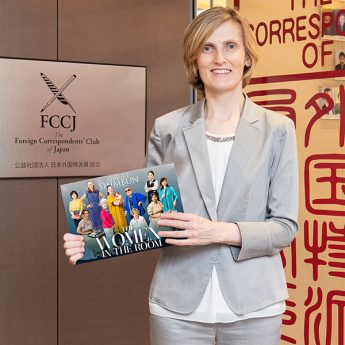Opportunities and limitations in Japan’s workforce
As a working mum in Japan, I am constantly challenged in my work environment, and stimulated by my personal and family life. Having moved here from the UK, I am grateful to find a balance in my professional and personal life.
But do other women in my situation feel the same, and what can local businesses learn from non-Japanese staff about working mothers?
The challenges that Japan’s workforce faces in attracting and retaining female professionals is well documented.
Figures show that nearly 70% of Japanese women leave the workforce after their first child, with a lack of childcare options and nursing support meaning many find it difficult to return. Over time, this has resulted in a lack of professional female role models, who show how to balance a career with family life.
Many economists believe that women are key to Japan’s future economic success, purely because the talent pool of skilled women is one of the country’s most underutilised resources. Yet, the simple fact is that it is difficult for Japanese women to achieve a work–life balance.
In 2013, I set up Mums in Business Tokyo—a network of working mums, both Japanese and non-Japanese. This expanding group meet socially to discuss the challenges and triumphs related to both careers and home life.
We are all leading busy social, professional and family lives, often rushing out of the house straight after picking up the children from day care, and sometimes having to leave early for overseas conference calls or late evening meetings.
The network generally meets in a casual restaurant or bar to enjoy a relaxing glass of wine in the company of like-minded women. Recently, I asked members to share their experiences of balancing professional and family life in Japan.
Unanimous feedback showed that members were enjoying their careers. The majority confessed that they enjoy the freedom that being a non-Japanese worker can bring, including less pressure to conform to cultural expectations.
However, many members expressed frustration regarding the lack of flexibility in their working day, due both to internal structures and the expectations of external clients. Many firms in Japan offer extremely limited flexible work options.
Members of Mums in Business reported that the concept of working from home or logging in to work remotely is foreign to their employers, who consider such options to be unorthodox.
Meanwhile, encouragingly, one member noted her employer—a global multinational—has plans to introduce a work-from-home pilot programme. For some time each week, staff in one business unit will be allowed to work remotely.
Let’s hope this is successful, and that those driving the programme remain engaged and supportive.
It would be great were this initiative to expand across the firm’s operations, and other businesses to learn from its success.
Another group member recently ran a confidence and diversity course for her female colleagues. It was a huge success; some 96% of the feedback from the event was positive.
Many participants indicated they had never before been exposed to this type of learning and development.
Lack of confidence is one of the main factors restraining Japanese women’s professional lives. The success of the diversity course signals a great chance for firms in Japan. If they can equip female staff with new skills, ideas and confidence, the women will be better equipped to help build a gender diverse workforce.





